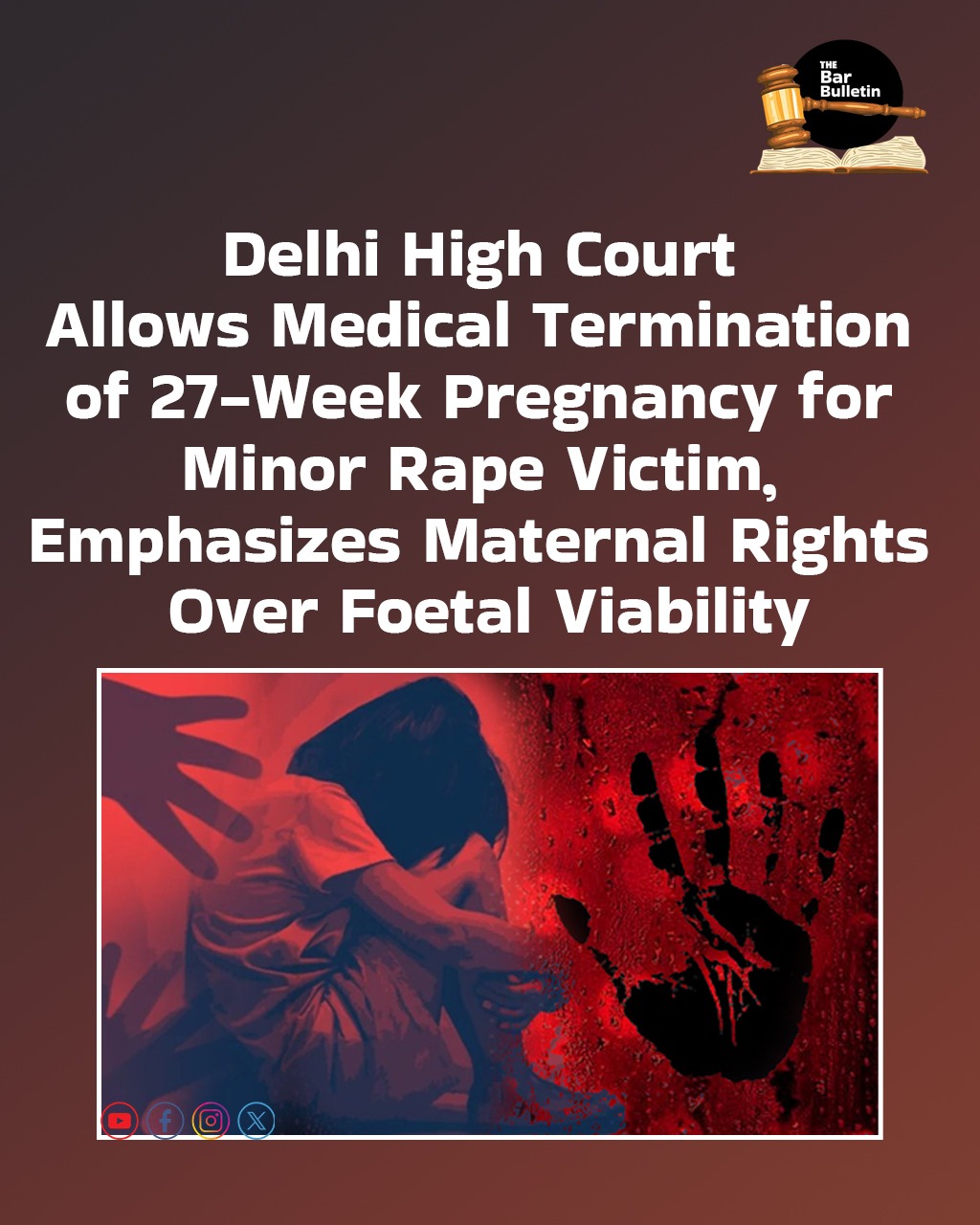The Delhi High Court allowed a writ petition filed by a 15-year-old minor girl through her mother seeking permission to terminate her pregnancy of 27 weeks, which had crossed the statutory limit of 24 weeks prescribed under the Medical Termination of Pregnancy Act, 1971. The Court held that the mental and physical well-being of the victim who had endured sexual assault must outweigh the mere probability of the foetus being born alive, and directed the Hospital to carry out the termination procedure.
The Petitioner argued that the pregnancy resulted from a sexual assault and its continuation would cause grave mental injury to the minor as well as to the unwanted child in the foetal stage. It was submitted that the right to life under Article 21 of the Constitution of India includes the right to live with physical and mental health, justifying the issuance of a writ despite the statutory bar under the MTP Act. It was further argued that the victim and her family had resided in a rented premise in 2016 where they came into contact with the accused, the landlord’s son, and cordial relations were maintained for nearly a decade, during which the accused and the victim developed a relationship. In December 2024, the accused allegedly lured the victim to his residence under the promise of marriage and established physical relations for the first time on 14.12.2024, and continued to exploit the victim sexually under the false pretext of marriage until April 2025. Subsequently, when the victim missed her menstrual cycle for two to three months, a pregnancy test was conducted on 31.08.2025, confirming the pregnancy, and the accused flatly refused to marry her and pressured her to abort the child.
On September 6, 2025, the victim disclosed the facts to her parents, leading to registration of FIR under Section 69 of the Bharatiya Nyaya Sanhita, 2023 and Section 6 of the POCSO Act, 2012. The victim was medically examined and subsequently an ultrasound was conducted which revealed the foetus to be about 27 weeks old. The victim was produced before the Child Welfare Committee on September 8, 2025.
However, the State opposed the petition stating that the foetus had already gone past the age of 24 weeks and at 27 weeks had a heartbeat, and even as per medical opinion the foetus may be born alive even if caesarian termination of pregnancy was carried out. The Court had earlier directed on September 10, 2025 that the Superintendent of Baba Sahab Ambedkar Hospital constitute a Medical Board to examine the minor and file a report within 24 hours.
The Medical Board report dated September 11, 2025 opined that the victim was a minor of 15 years only and pregnancy caused due to alleged sexual assault, and continuation of pregnancy would constitute grave injury to mental health of the victim under Section 3(b), Explanation 2 of the MTP Act. The Board noted that as the pregnancy was already 27+ weeks, the baby may be born alive and may survive with complications of prematurity, and if medical method of termination failed, surgical management may be required. The victim had moderate anaemia and may need blood transfusion.
The Court observed that considering the age of the petitioner and the mental and physical trauma inflicted upon her by the heinous act of sexual assault, continuation of the pregnancy would permanently scar her psyche and cause grave and irreparable harm to her physical and mental health. The Court noted that while the Medical Termination of Pregnancy Act, 1971 prescribed 24 weeks as the statutory limit, constitutional courts in exercise of their extraordinary jurisdiction under Article 226 may in exceptional circumstances permit termination beyond the statutory limit, and the present case clearly fell within such category.The Court directed the hospital to preserve the foetus for DNA testing purposes in connection with pending criminal proceedings and to preserve relevant foetal tissue samples for DNA identification. In the event the child was born alive, the hospital was directed to ensure all possible medical assistance and the Child Welfare Committee to take necessary steps in accordance with law, with the cost to be borne by the State.
Justice Arun Monga observed that with increasing cases seeking termination beyond the statutory limit, the question of foetal viability had assumed considerable importance in abortion jurisprudence. The Court noted that the rights of the woman flowing from Article 21 of the Constitution, comprising her life, liberty, dignity, and decisional autonomy, must prevail over competing claims of foetal survival.
The Court noted the absence of clear statutory framework regarding rights of viable foetus and observed that judicial discretion, however sensitively exercised, cannot be a substitute for legislative determination. The Court concluded that the law must clearly delineate the balance between maternal autonomy and foetal rights at the stage of viability, and it was time for lawmakers to address this question in no uncertain terms.
Appearances:
Petitioner: Anwesh Madhukar, Advocate with Pranjal Shekhar, Ishat Singh and Prachi Niwan, AdvocatesState: Amol Sinha, ASC (Criminal) with SI Rupesh Raj, PS Subhash Place



